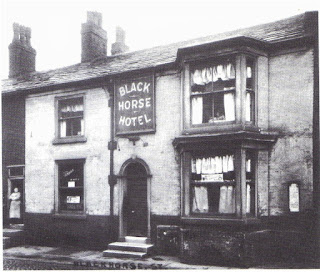The Black Horse - and next-door neighbour - pictured in the 1920s.
The Black Horse Hotel was located on Blackhorse
Street and dated back to the late-nineteenth century.
Blackhorse Street was initially known as Thweat
Street and was named after James Thweat, whose surname was often spelt Thweats
or Thwaites. He opened one of Bolton’s first cotton mills in nearby King
Street.
The Black Horse pub dated back to the
late-eighteenth century and it first appeared in the local licensing records of
1801. [1] Isaac Dobson lived at the pub shortly after he arrived in Bolton in
1789, while Lane’s Masonic Records suggests that the Lodge Of Antiquity, which
was formed in Leigh in 1776, met at the Black Horse from 1793 to 1802.
In the early part of the nineteenth century Thweat
Street was lined with houses, but it became a heavily-industrialised area as
the century went on.
Dobson went into business with Peter Rothwell, the
owner of a timber yard on Thweat Street and the firm that eventually became
Dobson and Barlow was born.
With Isaac Dobson still resident at the Black Horse
the pub eventually became a meeting point form some of the town’s most
prominent business people and during the first decade of the nineteenth century
the street took on the name of Blackhorse Street – after the pub - which it
retains to this day.
These same prominent businessmen, Isaac and Benjamin
Dobson, Peter Rothwell and Benjamin Hick, formed ‘the Black Horse Club,’ an
informal business club which secured an annuity of £63 15s for the inventor
Samuel Crompton, who often drank at the pub and attending meetings of the club.
Crompton, who lived in nearby King Street, was famed at the Black Horse for
sitting with his one glass of ale and “seldom speaking, except when directly
addressed, and then always briefly and to the point.”
Dobson’s business prospered as did Rothwell’s nearby
Union Foundry and, presumably, the Black Horse. Dobson's had moved to Kay Street
by 1860, by which time the firm was employing 1600 workers.
The Black Horse Inn lasted until 1937. It was a
Tong’s house in the early years of the twentieth century and was transferred to
Walker Cain Ltd of Warrington when they bought out Tong’s in 1923. As Bolton Council further developed the Civic Centre
around the back of the Town Hall they knocked down the Black Horse and
landscaped the area. In the late-sixties Black Horse Street was widened to accommodate
the increase in bus traffic going into Moor Lane bus station.
[1] Bolton Pubs, 1800-2000, by Gordon Readyhough
(2000).
Blackhorse Street pictured in April 2012 (copyright Google Street View) looking towards Moor Lane bus station. The Black Horse Hotel was situated on the left-hand side of this view. When Howell Croft bus station was closed in 1969 and bus traffic transferred to Moor Lane, Blackhorse Strreet was widened. The Black Horse Hotel was situated where the pavement now stands, roughly just past the lamp post on the left.


No comments:
Post a Comment